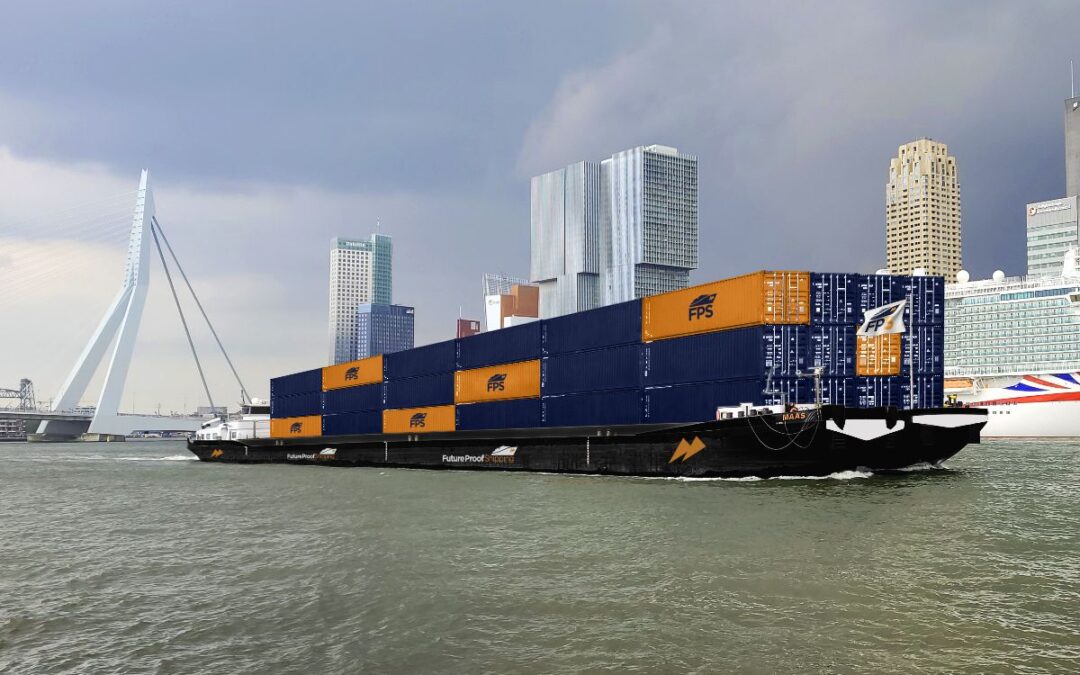The Central Commission for the Navigation of the Rhine has recommended that Future Proof Shipping’s motor cargo vessel Maas receives an exemption from the Rhine Vessel Inspection Regulations. The exemption is to allow the use of hydrogen as a fuel for propulsion and power supply.
With the Maas, Future Proof Shipping (FPS) seeks to achieve zero-emission shipping. The first step towards this goal was completing a detailed Hazard Identification (HAZID) study with classification society Lloyd’s Register for the hydrogen-powered vessel. Once completed, the Central Commission for the Navigation of the Rhine (CCNR) recommendation was the next target on FPS’ radar.
In the absence of specific rules for the design approval of hydrogen fuelled vessels, the “alternative design process”, by which the safety, reliability and dependability of the systems must be demonstrated to be equivalent to that achieved with comparable conventional systems, is currently the only means of approval for hydrogen vessels.
The recommendation states just that: that the use of hydrogen as a fuel on board the Maas is considered to be sufficiently safe if a number of critical conditions such as risk assessments, crew training, bunkering and data recording, are met at all times.
Also read: Inland vessel Maas to be powered by hydrogen fuel cell system
Catalyst to speed up approval process
To receive a recommendation from the CCNR, first a risk analysis and design optimisation study must be completed, with the help of a classification society. The FPS team has been working closely with Lloyd’s Register and the Dutch Ministry of Infrastructure who filed the application for the recommendation with the CCNR, on behalf of FPS.
‘This landmark exemption will hopefully act as a catalyst to speed up the approval process and establish concrete rules dedicated to hydrogen-fuelled vessels, and ultimately clear the path to zero-emission shipping for all who are prepared to make the transition,’ says Richard Klatten, CEO of FPS.
Bas Joormann, WEA Inland Waterway Product Manager at Lloyd’s Register EMEA adds: ‘I believe this recommendation will surely help in the further development of requirements for the use of alternative fuels, and I expect that for future projects it will be easier to get the required recommendations.’
Retrofit to be completed later this year
FPS can now move ahead with the advanced engineering plans for the Maas and soon they will be ready to submit documentation for the final stage of class approval from LR.
Also read: Holland Shipyards to convert inland vessel to hydrogen propulsion
Once the retrofit of the Maas is completed later this year, the vessel will continue to ship container cargo between Rotterdam and Antwerp and is expected to reduce greenhouse gas emissions by 2000 CO2e tonnes annually.
‘The development of techniques for alternative means of propulsion and energy carriers, such as hydrogen and batteries, fits within the ambitions in the Green Deal on Maritime and Inland Shipping and Ports to make inland shipping more sustainable,’ states Annelies van Dijk-Volker, Ministry of Infrastructure & Watermanagement and Dutch representative in CCNR. ‘The Dutch Ministry of Infrastructure & Water Management is looking forward to the experiences that will be gained with the application of hydrogen.’
Funding support
This innovative project is supported by funding from the Dutch RVO (Subsidie Duurzaam Scheepvaart scheme), Interreg North Sea Programme (via the ZEM Ports NS project) and a stimulation scheme for sustainable inland shipping from the Port of Rotterdam, which is executed by the Expertise en InnovatieCentrum Binnenvaart (EICB).
[newsletter_form title=”Would you like to receive the free newsletter of SWZ|Maritime? Please fill in your e-mail address here:”]








